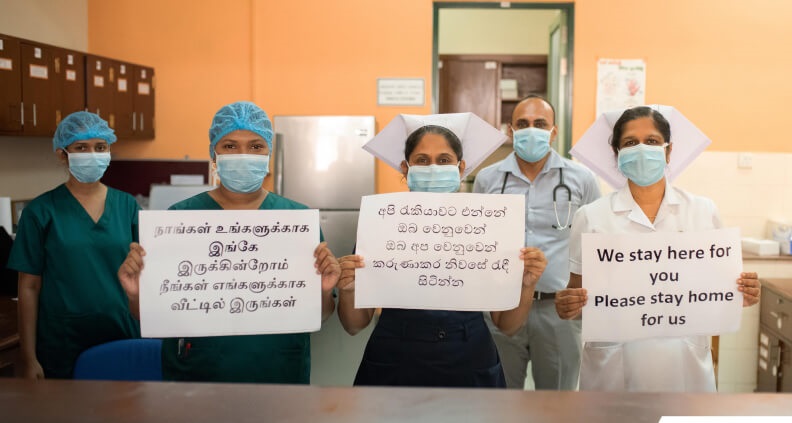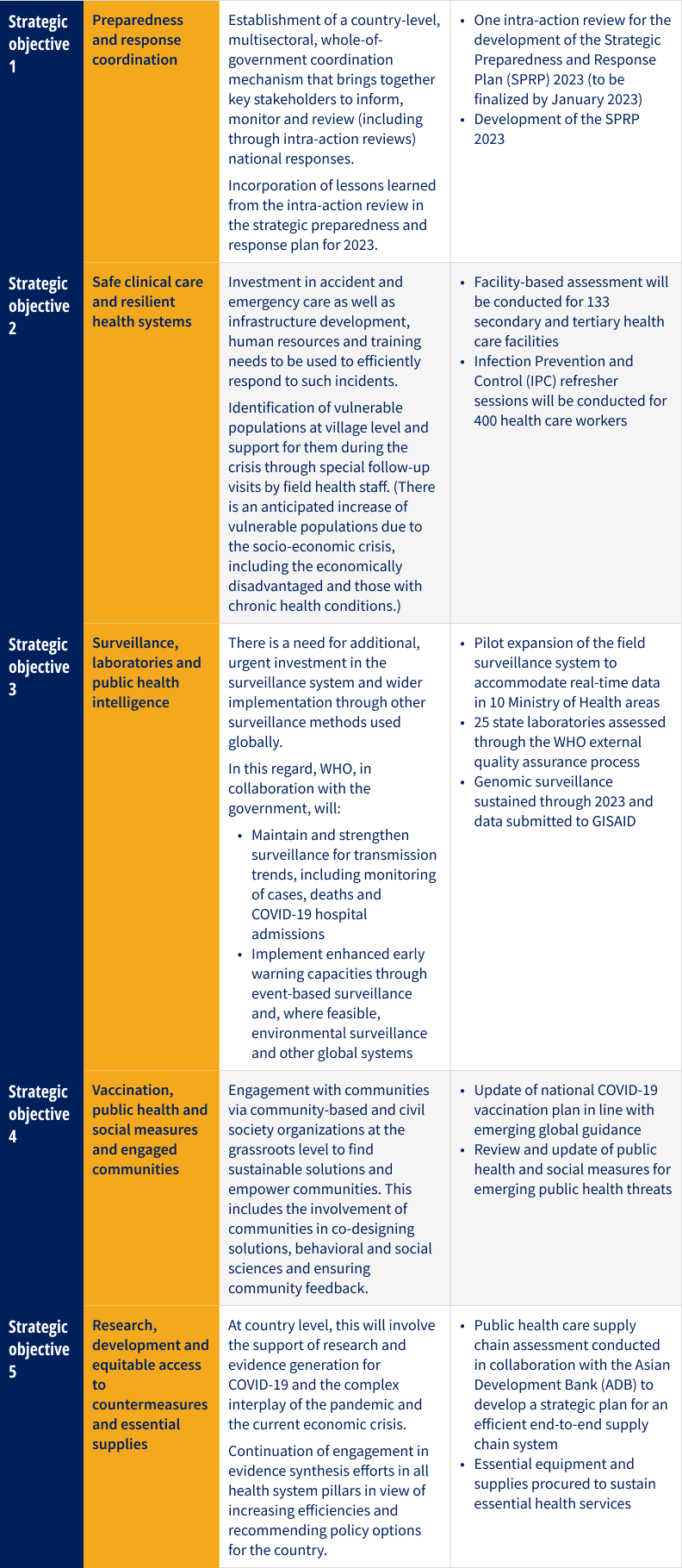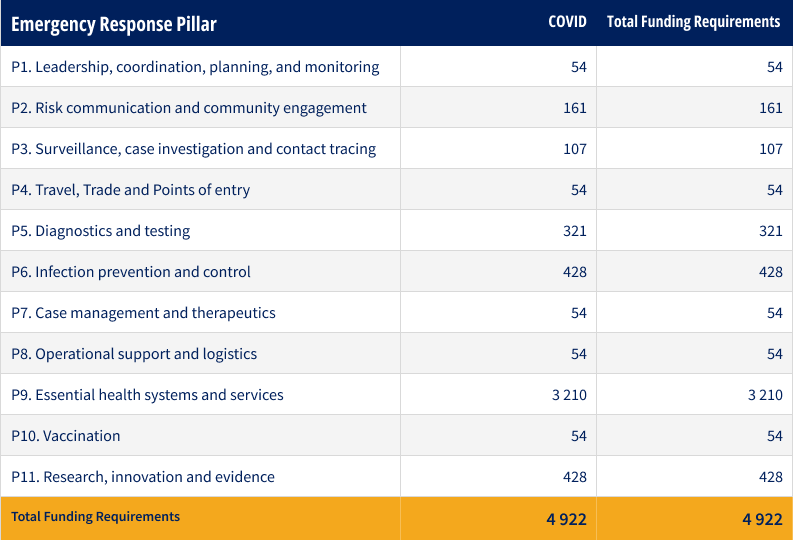
Sri Lanka
Sri Lanka
- Requirements (US$): 4.9 million
Context
Sri Lanka is facing a dual crisis with the ongoing COVID-19 pandemic and the economic crisis that unfolded in the first half of 2022 due to a lack of foreign and local currency reserves. This has limited the importation of several essential commodities including fuel, medicines and consumables.
With 80% of medical supplies in Sri Lanka being imported, there has been a shortage of essential medicines since April 2022 due to import limitations. As of October 2022, 150 essential medicines were out of stock, including blood thinners, antibiotics, vaccines and cancer chemotherapy drugs. The shortages have severely affected the health care system and have curtailed operational capacity. Routine non-emergency surgeries, medical procedures and laboratory tests are often delayed or put on hold, and outpatient clinics have been unable to provide patients with necessary refills. There is a need for $8 million USD to purchase raw materials to maintain the local production of essential medicines through the State Pharmaceutical Manufacturing Corporation (SPMC).
COVID-19 cases and deaths have been declining over the past several months. However, since no active surveillance is being conducted, these results must be interpreted with caution. Genomic surveillance for variant identification has continued. The country has vaccinated 66.7% of its population with two doses and 36.9% with a first booster. The vaccination rate has seen a significant decline in the past few months despite the availability of adequate vaccines doses.
There has been a significant intergenerational toll on health due to the lack of supplemental feeding, a change in food habits with rising prices, access to family planning services and general restrictions in mobility due to travel costs. The goal for 2023 is to strengthen essential health services amidst the tumultuous economic conditions and end the acute phase of the COVID-19 pandemic. The hard-earned public health gains of Sri Lanka during past decades are at stake with the economic crisis, thus all efforts need to be taken to sustain the essential health services and key public health functions during the recovery period and beyond.

From COVID-19: General stay at home message
Emergency response
WHO is conducting rapid assessments for evidence generation while identifying the health system’s critical points to identify policy options for the country in the coming year. With this information available by December 2022, WHO plans to contribute to the 2023 outbreak and crisis response in Sri Lanka with support for maintenance of essential curative and preventive services.
WHO continues to support the strengthening of the health system by providing critical equipment support which are difficult to procure through the local procurement system due to the foreign exchange crisis. WHO will also support the country in all five strategic areas during 2023 to ensure robust emergency preparedness and response.
In the current context, Sri Lanka faces several health threats aside from the burden of the financial crisis and COVID-19. Dengue fever has been on the rise during the 2022 July-September monsoon season, partly due to vector control activities being affected by the lack of fuel and shortage of mosquito/larvae control chemicals. Sri Lanka has detected two Mpox cases in the country, for which preparedness and a timely response are essential, as well as strong surveillance and laboratory testing.
Strategic objectives


Key activities
- Ensure strategic preparedness for 2023 based on lessons learned from the intra-action review
- Provide facility-based assessment of all secondary and tertiary care facilities, strengthening IPC at health care institutions and health care worker capacity building for IPC
- Strengthen essential health services including mental health and psychosocial services to reach vulnerable populations
- Strengthen laboratory testing, quality assurance, networking, expanding of genomic sequencing capacity and strengthening the field-level real-time data surveillance system
- Support the implementation of risk communication and community engagement strategy, periodic review of public health and social measures (PHSM) at points of entry and vaccination/cold chain assessments
- Provide technical assistance for the assessment of supply chain management and development of a strategic plan for an efficient end-to-end supply system
- Strengthen country capacity to procure supplies and equipment to promote a supportive environment for maintaining essential health services, including PHSM compliance
- Research and evidence on COVID-19 including the effects of the COVID-19 pandemic on the financial situation and participation in global WHO studies
Funding requirements
Overall country funding requirements, including COVID-19, by pillar (US$’000)


Success stories
International Search and Rescue Advisory Group (INSARAG) Basic Search and Rescue Training Course: A Joint Project by the Sri Lankan Disaster Management Centre and WHO
Sri Lanka is affected by various hazards, including weather-related events such as cyclones, monsoonal rain and subsequent flooding and landslides. Droughts are also common due to variations in the monsoon seasons. Of these, localized and seasonal flooding poses the greatest threat to the population, and the flood risk profile is increasing due to the growing impact and frequency of hydrometeorological hazards. Strengthening urban-search and rescue (USR) capacity for emergency response has enabled the development of multifunctional response teams whose members can provide immediate assistance to affected persons.
The Sri Lankan Disaster Management Centre, in partnership with WHO, has successfully concluded two 10-day sessions of the Basic Search & Rescue Training Course based on International Search and Rescue Advisory Group (INSARAG) guidelines.
These full-scale simulation exercises provide an opportunity to validate and enhance preparedness and response plans, procedures and systems for natural disaster situations in Sri Lanka while building capacity among multi-sectoral first responders. These search and rescue (SAR) teams will be linked to the national 24/7 Emergency Operations Centre (EOC) under the Disaster Management Centre (DMC) and will be on standby for early mobilization in the event of any disaster.
Training in 2022 has incorporated lessons learned from the past two years to further refine the program, including an introduction to first response; chemical, biological, radiological and nuclear (CBRN) event response training; disaster environment and scene management search and rescue; basic medical rescue and a consolidation exercise.
For more information
Dr. Shalala Ahmadova | Public Health Administrator | WHO Office Sri Lanka | ahmadovasha@who.int
Dr. Sapumal Dhanapala | NPO (Emergency Risk Management) | WHO Office Sri Lanka | dhanapalas@who.int

